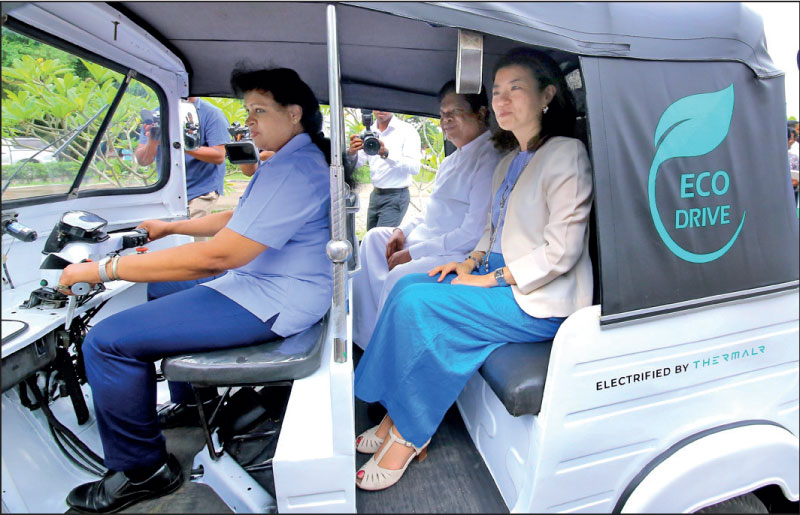Friday Feb 20, 2026
Friday Feb 20, 2026
Friday, 12 May 2023 04:17 - - {{hitsCtrl.values.hits}}

Transport and Highways Minister Bandula Gunawardena and UNDP Resident Representative Azusa Kubota take a ride in the first eTuk-Tuk launched as a pilot yesterday – Pic by Ruwan Walpola
The first set of a planned 500,000 converted eTuk-Tuks was put to the road by the Government in partnership with the United National Development Program (UNDP) as part a drive to promote low carbon emobility solution.
Sri Lanka, like many other global nations, is working towards adopting greener and cleaner approaches for a more sustainable and resilient future. With the prevailing socio-economic crisis, a shift towards adopting sustainable mobility approaches has been identified as a necessity for a green recovery process.
In line with this, the UNDP is working closely with the Ministry of Transport and Highways and the Ministry of Power and Energy, together with the Department of Motor Traffic and the National Transport Commission to develop a project to mainstream e-mobility through the conversion of 500,000 Tuk-Tuks to electric vehicles (EVs) or e-Tuk-Tuks over a 5-year period.
The project aims to support the conversion of petrol three-wheelers to electric three-wheelers as a means for enhancing mobility as a driver of low-carbon, inclusive, equitable development pathways within Sri Lanka. The proposed three-phased project consists of an incubation phase, a demonstration phase and an acceleration phase. The incubation phase will test the conversion process, the demonstration phase will support conversions and the acceleration phase will use market forces for conversion through concessional financing and infrastructure development.
Speaking at a project launch briefing yesterday Transport and Highways Minister Bandula Gunawardena said: ‘‘This pilot project will serve as a platform to launch electric three wheelers in the country. Electric three wheelers will not only benefit individual operators but also contribute to spring boarding the country’s economic recovery process.’’
UNDP Resident Representative Azusa Kubota said: “This pilot project is a part of UNDP’s Green Development Portfolio which is currently being developed. This portfolio aims to build solutions and support Sri Lanka’s development in catalysing low-carbon, green, and inclusive development within which sustainable transportation and e-mobility play a key role.
“Through this pilot project UNDP will support the Government to establish a viable system which can be scaled up and will prioritise marginalised groups, including women and persons with disabilities while keeping equality and equity at the core of our work.”
The incubation phase will support the conversion of 200 petrol three-wheelers to electric three-wheelers. The following criteria will be applicable in selecting qualifying vehicles and owners for the incubation phase: age of Tuk-Tuk should not be greater than 10 years from date of manufacture, only petrol 4-stroke three wheelers are eligible, parties from Makumbura and Pettah will be eligible, priority will be given to applicants whose livelihood is dependent on a single three-wheeler, and preferential selections are given to women owners/ operators and persons with disabilities.
Commissioner General of Motor Traffic Nishantha Anurudda Weerasinghe noted the importance of the project and the role of DMT in promoting e- Mobility in Sri Lanka, stating ‘‘DMT has established a system for the registration of electric three wheelers in Sri Lanka. We have also developed specifications for electric three wheelers with the support of UNDP. We believe that this intervention will encourage petrol three-wheel owners to come forward and convert their three wheelers to electric three wheelers’’
The strict selection criteria will minimise the risk of failure due to technical issues, the risk of delay in conversions due to limited capacity and will test the performance of different technologies available in the market-opportunity for project stakeholders to test the market for energy efficiency (km/kWh), actual range per charge and functionality of safety features. The findings from the incubation phase will then be used in designing the demonstration phase.
Considering these aspects Pettah and Makumbura have been identified as viable locations for the initial conversion pilot in the Western Province and 100 petrol three-wheelers will be converted to electric three-wheelers from each location. During the pilot phase, UNDP will cover the full cost of conversion to electric three-wheeler and through this aims to support the revival of micro level/informal sector economic activities to inject much needed currency into the local economy.